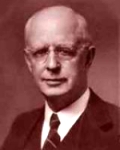|
MAJOR BIBLE THEMES
By Dr.
Louis Sperry Chafer
|
"Bible doctrines are the bones of
revelation and the attentive Bible student must be
impressed with the New Testament emphasis on sound
doctrine (Matt. 7:28; John 7:16, 17; Acts 2:42; Rom.
6:17; Eph. 4:14; 1 Tim. 1:3; 4:6, 16; 6:1; 2 Tim.
3:10, 16; 4:2, 3; 2 John 1:9, 10)."
~ Dr. Louis Sperry Chafer ~ |
The studies presented
herein are a continuation
of Major Bible Themes which, Lord willing, will
eventually be presented
in its entirety. Major Bible Themes may serve as a wonderful outline for personal or group
Bible study.
Links to previous studies in the series may be found in our
Library
and
Sound Doctrine
pages. ~ editor
CHAPTER XXI:
SATAN: HIS PERSONALITY AND POWER
&
CHAPTER XXII:
SATAN: HIS WORK AND DESTINY
|
"An immeasurable
gulf exists between the uncreated, self-existent,
eternal Persons of the Godhead, and this the chief
of God's creatures." |
~
CHAPTER XXI:
SATAN: HIS PERSONALITY AND POWER
This chapter
introduces the highest being among all the creatures of God.
However, an immeasurable gulf exists between the uncreated,
self-existent, eternal Persons of the Godhead, and this the
chief of God's creatures.
I. THE PERSONALITY OF
SATAN
Since he does not appear in
corporeal form, Satan's personality, like that of the Godhead
and like all the angelic hosts, must be accepted upon the
evidence set forth in the Scriptures. Considering this evidence
we may note:
1. Satan was Created as a Person.
The fact of the creation of all things that are in heaven and in
earth, visible and invisible, whether they be thrones, or
dominions, or principalities, or powers, and that these were
created by Christ and for Christ, is stated in Colossians 1:16.
The time of the creation of the angelic host is not stated
beyond the fact that their creation probably preceded that of
all material things, and was itself preceded by that eternity of
existence on the part of the Godhead, which existence is
declared in John 1:1, 2.
Among all the heavenly hosts, Satan's creation alone is
mentioned in particular. This fact suggests the supreme place
which Satan holds in relation to all the invisible creatures of
God.
In Ezekiel 28:11-19 there is recorded a lamentation addressed to
The king of Tyrus, and while
this may have had some partial and immediate application to a
king in Tyrus, it is evident that the supreme one among all the
creatures of God is in view; for the one here addressed was said
to be the sum of wisdom, and
perfect in beauty. He had been in Eden,
the garden of God (probably the primal Eden of God's
original creation, rather than the Eden of Genesis 3), and by
divine design was created and anointed as a covering cherub over
the holy mountain of God, which, in Biblical imagery, represents
the throne or center of God's governing power. No king of Tyrus
could answer this description. In fact, this description could
apply to none other than Satan as he existed before his sin and
fall.
2. Satan Exercises all the Functions of a Person.
Of many Scriptures which set forth the personality of Satan, the
following may be noted:
Isaiah 14:12-17. Contemplating Satan as having completed his
course and having been judged finally at the end of time, the
prophet addressed him in this passage under the heavenly title
of Lucifer, son of the morning,
and sees him as fallen from his primal estate and glory. He who
didst weaken the nations is
also guilty of opposing his own will against the will of God in
five particulars, and in this passage, as in Ezekiel 28:15, his
sin is said to be a secret purpose hid within his own heart
which God discovered and disclosed (note 1 Tim. 3:6).
Genesis 3:1-15. By the events recorded in this passage, Satan
gains the title of Serpent,
for through the serpent he appeared to Adam and Eve. Every word
here spoken and design [sic] revealed is an evidence of Satan's
personality (note 2 Cor. 11:3, 13-15; Rev. 12:9; 20:2).
Job 1:6-12; 2:1-13. A revelation peculiar to these texts is that
Satan has access to God (note Luke 22:31; Rev. 12:10) as well as
to men (1 Pet. 5:8; Eph. 6:10-12), and that he exhibits every
feature of a true personality.
Luke 4:1-13. Again the personality of Satan is revealed when in
the wilderness he comes into conflict with the Son of God -- the
Last Adam. He who purposed to become like the Most High (Isa.
14:14), and who recommended this purpose to the first man and
woman (Gen. 3:5), is now seen offering all his earthly
possessions to Christ if only He will worship him. This
proffered authority and power which Christ refused will yet be
received and administered by the Man of Sin (1 John 4:3; 2
Thess. 2:8-10).
Ephesians 6:10-12. The strategies and warfare of Satan against
the children of God as declared in this passage are proof
positive of the personality of Satan. There is no mention in the
Scriptures of a warfare by Satan against the unregenerate: they
are his own, and therefore under his authority (John 8:44; Eph.
2:2; 1 John 5:19, R.V.).
II. THE POWER OF SATAN
Though morally fallen and now
judged in the cross (John 12:31; 16:11; Col. 2:15), Satan has
not lost his position, and he has lost but little of his power.
His power both as to personal strength and authority is
disclosed in two forms:
1. His Personal Strength.
His personal strength cannot be estimated. According to his own
declaration, which Christ did not deny, he has power over the
kingdoms of this world, which kingdoms he said were delivered
unto him, and which power he bestows on whom he will (Luke 4:6).
It is said of him that he hath the power of death (Heb. 2:14),
but that power has been surrendered to Christ (Rev. 1:18). Satan
had the power over sickness in the case of Job (Job 2:7), and
was able to sift Peter as wheat in a sieve (Luke 22:31; 1 Cor.
5:5). Likewise, Satan is said to have weakened the nations, to
have made the earth to tremble, to have shaken kingdoms, to have
made the earth a wilderness, destroying the cities thereof, and
not to have opened the house of his prisoners (Isa. 14:12-17).
Against the power of Satan even Michael the archangel durst not
contend (Jude 1:9); but there is victory for the child of God
through the power of the Spirit and the blood of Christ (Eph.
6:10-12; 1 John 4:4; Rev. 12:11). Satan's power and authority
are exercised always and only within the permissive will of God.
2. Satan is Aided by Demons.
Satan's power is increased by the innumerable host of demons who
do his will and serve him. Though he is not omnipresent,
omnipotent, nor omniscient, through the wicked spirits he is in
touch with the whole earth.
QUESTIONS
1. On what ground must the
personality of Satan be received?
2. By whom and for whom were all things created?
3. What is suggested by the fact that among all the heavenly
hosts Satan's creation is mentioned in particular?
4.
a. Give the passages in which Satan's creation and early
condition are described.
b. What things are said of his first estate?
5. What evidence of his personality and power are indicated in
Isaiah 14:12-17?
6. What evidence is indicated in Genesis 3:1-15 and Job 1:6-12;
2:1-13; Luke 22:31; Ephesians 6:10-12; 1 Peter 5:8 and
Revelation 12:10?
7. Mention the facts set forth in Luke 4:1-13.
8. Against whom does Satan wage his warfare?
9.
a. In what sense is Satan fallen?
b. Is he cast out of Heaven (see Rev. 12:9)?
10. Is Satan's professed authority over the kingdoms of the
earth the statement of fact?
11. Where is the power of death now invested?
12. What evidence have we of Satan's power as seen in Job, in
Peter, and over the nations?
13.
a. Did Michael contend with Satan in his own strength?
b. How, then, may the Christian be victorious?
14. How is Satan assisted in his undertakings by the innumerable
demons?
~
CHAPTER XXII:
SATAN: HIS WORK AND DESTINY
Two errors regarding
Satan are current and since he alone is advantaged by them it is
reasonable to conclude that he is the author of them.
1. Many believe that Satan does not really exist and that the
supposed person of Satan is no more than an evil principle, or
influence, which is in man and in the world. This conception is
proved to be wrong by the fact that there is the same abundant
evidence that Satan is a person as there is that Christ is a
person. The Scriptures, which alone are authoritative on these
matters, treat one to be a person as much as the other, and if
the personality of Christ is accepted on the testimony of the
Bible, the personality of Satan must also be accepted on the
same testimony.
2. Likewise, others believe that Satan is the direct cause of
sin in every person. This impression is not true (1) because
Satan is not aiming to promote sin in the world. He did not
purpose to be a fiend, but rather to be
like the most High (Isa. 14:14); he is not aiming to
destroy, so much as he is to construct, and to realize his own
ambition for authority over this world system, which system
proposes culture, morality, and religion (2 Cor. 11:13-15). The
impression that Satan is the direct cause of sin is not true (2)
because human sin is said to come directly from the fallen human
heart (Mark 7:18-23; Jas. 1:13-16; Gen. 6:5).
I. THE WORK OF SATAN
The following are only a few
of the many passages bearing on the work of Satan:
Isaiah 14:12-17. This passage reveals Satan's original and
supreme purpose. He would ascend into Heaven, exalt his throne
above the stars of God, and be like the most High. To this end
he will use his unmeasured wisdom and power; he will weaken the
nations, make the earth to tremble, make the world as a
wilderness, destroy the cities thereof, and refuse to release
his prisoners. Though every phrase of this passage is a
startling disclosure, two in particular may be noted:
1. I will he like the most High.
As recorded in the Scriptures, the activities of Satan following
his moral fall can be traced only in the line of this supreme
motive. It was this purpose which in all seriousness he
recommended to Adam and Eve (Gen. 3:5), and they, by adopting
Satan's ideal, became self-centered, self-sufficient, and
independent of God. This attitude on the part of Adam and Eve
became their very nature and has been transmitted to all their
posterity to the extent that their posterity are called the
children of wrath (Eph. 2:3;
5:6; Rom. 1:18), they must be born again (John 3:3), and, when
saved, have a struggle to be yielded wholly to the will of God.
Again, Satan's desire to be like the
most High is seen in his passion to be worshiped by
Christ (Luke 4:5-7). When the Man of Sin enters the holy place
and is worshiped as God (2 Thess. 2:3, 4; Dan. 9:27; Matt.
24:15; Rev. 13:4-8), for a brief moment, Satan's supreme desire
will be realized under the permissive will of God.
2. He opened not the house of his
prisoners. The entire prophecy from which this phrase
is taken is concerning the work of Satan as it will have been
completed in the days of his final judgment. Doubtless there is a
larger fulfillment yet future; however, we know that Satan is now
doing all in his power to keep the unsaved from being delivered
from the power of darkness and translated into the kingdom of
God's dear Son (Col. 1:13). Satan is the one who energizes the
children of disobedience (Eph. 2:2), blinds the minds of the
unsaved lest the light of the Gospel shall reach them (2 Cor.
4:3, 4), and holds the unconscious world in his arms (1 John
5:19, R.V.).
It is also revealed that Satan in his warfare will counterfeit
the things of God, which undertaking will likewise be in accord
with his purpose to be like the most
High. He will promote extensive religious systems (1
Tim. 4:1-3; 2 Cor. 11:13-15). In this connection, it should be
observed that Satan can promote forms of religion which are
based on selected Bible texts, which elevate Christ as the
leader, and which incorporate every phase of the Christian faith
excepting one -- the doctrine of salvation by grace alone on the
ground of the shed blood of Christ. Such satanic delusions are
now in the world and multitudes are being deceived by them. Such
false systems are always to be tested by the attitude they take
toward the saving grace of God through the efficacious blood of
Christ (Rev. 12:11).
Satan's enmity is evidently against God alone. He is in no way
at enmity with the unsaved, and when he aims his
fiery darts at the children
of God, he attacks them only because of the fact that they are
indwelt by the divine nature, and through them he is enabled to
secure a thrust at God.
Likewise, the attack against the children of God is not in the
sphere of flesh and blood,
but in the sphere of their heavenly association with Christ.
That is, the believer may not be drawn away into immorality, but
he may utterly fail in prayer, in testimony and in spiritual
victory. Such failure, it should be seen, is as much defeat and
dishonor in the sight of God as those sins which are freely
condemned by the world.
II. THE DESTINY OF SATAN
As the Word of God is
explicit regarding the origin of Satan, so it is explicit
regarding his career and destiny. Five progressive judgments of
Satan are to be distinguished:
1. Satan's Moral Fall.
Though the time in the dateless past is not disclosed, Satan's
moral fall, with its necessary separation from God, is clearly
indicated (Ezk. 28:15; 1 Tim. 3:6). It is evident, however, that
he did not lose his heavenly position, the larger portion of his
power, or his access to God.
2. Satan's Judgment through the Cross.
Through the cross a perfect judgment has been secured (John
12:31; 16:11; Col. 2:14, 15), but the execution of that sentence
is yet future. This sentence with its execution was predicted in
the Garden of Eden (Gen. 3:15).
3. Satan will be cast out of Heaven.
In the midst of the coming Tribulation and as a result of a
war in Heaven, Satan will be cast out of Heaven and be limited
to the earth. He will then act in great wrath knowing that he
has but a short time to continue (Rev. 12:7-12. Note, also, Isa.
14:12; Luke 10:18).
4. Satan will be confined to the Abyss.
For the thousand-year reign of Christ upon the earth, Satan will
be sealed in the abyss, after which he must be loosed for a
little season (Rev. 20:1-3,
7).
5. Satan's Final Doom.
Having promoted an open rebellion against God during the
little season, Satan is then
cast into the lake of fire to be tormented day and night for ever
and ever (Rev. 20:10).
QUESTIONS
1. What are the two general
errors regarding Satan?
2. Give the evidence from the Scriptures that Satan exists as a
person.
3. What is Satan's supreme motive?
4. From what source does human sin arise?
5. What are the outstanding facts regarding Satan as recorded in
Isaiah 14:12-17?
6. Whom is Satan seeking to imitate?
7. Trace his passion to be like the Most High in two events of
history and one of prophecy.
8. What is Satan's attitude toward the unsaved as to their
salvation?
9. How does he accomplish his ends?
10. What undertakings are predicted for Satan, in his
counterfeiting the truth of God?
11. What one theme does he of necessity omit from his false
systems?
12. Against whom, primarily, is Satan at warfare?
13. In what sphere does he attack the children of God?
14. Trace the five aspects of divine judgment upon Satan.
|
Major Bible
Themes herein presented is its first edition
(copyright 1926), is in the public domain, and may be
freely downloaded in its entirety or chapter by chapter
at
http://www.spiritual-research-network.com/major-bible-themes.html.
Information for purchase
of the revised edition by John F. Walvoord (copyright
1974) may be found at the same address.
Dr. Louis Sperry Chafer (1871-1952)
was the founder of Dallas Theological Seminary, and from
1924 until his death, served as the its first President
and Professor of Systematic Theology. His
ground-breaking eight volume Systematic Theology,
first published in 1947-1948,
was the first systematization of a premillennial,
dispensational interpretation of the Scriptures.
|
Return to Home Page

|



